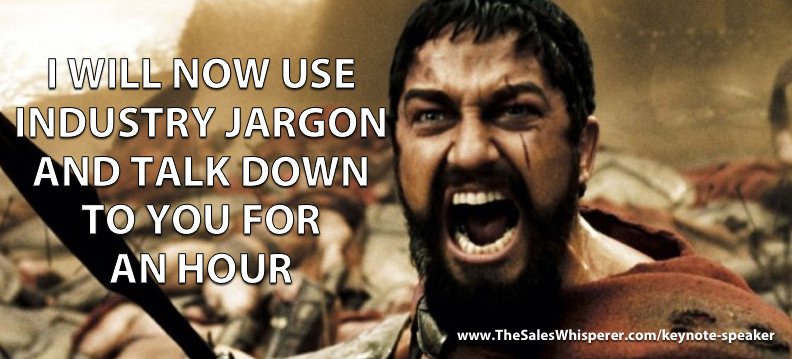Business jargon in marketing sure makes you sound like you know what you’re talking about. More important, does your target audience know what you’re talking about?
Core competencies …
Ecosystems …
Synergies …
Businesses love to drop multi-syallabic jargon into their marketing. It makes them seem super smart.
But you know what’s smarter (and harder)?
Speaking the language of your target audience. Let’s do that instead.
How to Cure Your Jargon in Marketing Addiction
Look, it’s easy to get drawn in.
We’ve all been guilty from time to time of using words we feel are shinier than plain language. Because others in our field are doing the same to show off their knowledge.
Organizations are often more worried about coming across as unprofessional in their communications than they are about being understood.
If we mystify our audience, we think, with words they don’t understand, they will recognize that we know things they don’t and seek products, services, or guidance from us.
That may be the way to impress academics, but heavy jargon use is no way to build trust.
Organizations are often more worried about coming across as unprofessional in their communications than they are about being understood.
You can’t blame the educated professional for this. Many of us were trained in school to write “up.” It was all about impressing the teacher.
It’s an entirely different skill to educate the other students.
What would it look like if organizations all dropped the pretense and just wrote what they meant, peer-to-peer?
Real Talk, No Jargon
Here’s some copy from a website for a law firm I won’t specify, chock full of jargon:
“Our interdisciplinary corporate and transactional practices represent national and international clients of various sizes from a wide range of industries. LAW FIRM’S lawyers’ ability to draw on diverse practice areas within the firm is a key strength in negotiating a variety of specialized commercial contracts, as well as in most types of corporate transactions. We work with clients to help them meet their goals by effectively handling both routine corporate matters and high-stakes transactions that require innovative thinking and novel structures.”
This language was no doubt inspired by other law firms whose buzz words sounded thoroughly impressive to the copywriter who generated this text.
Some of the wording is meaningless without specific examples (e.g. “specialized commercial contracts”), and some is so loose in meaning it might as well not be there at all (e.g. “novel structures”).
Let’s try a jargon-free version:
“We have clients from all over the world, who serve their communities in a variety of ways. That’s why LAW FIRM’S team has experience in all types of business law. We look forward to helping you through your sale, purchase or any other legal challenge.”
Be honest.
Did you glean any more information in the first version that makes a shred of difference as you decide whether to use this firm? Did jargon give you any added confidence, or did it just annoy or even confuse you?
Let’s De-Jargonize Our Marketing
You’re not writing for the teacher anymore. Still, you might wonder whether “dumbing down” your industry is a good idea.
Don’t think of it that way.
“Simple” is not the same as “dumb”. Simple is what busy professionals want. Nobody wants to waste brain power on deciphering jargon except the people who invent it.
Let’s leave the fancy talk in the classroom.
If you need help with the de-jargonization of your marketing, you know what to do.

